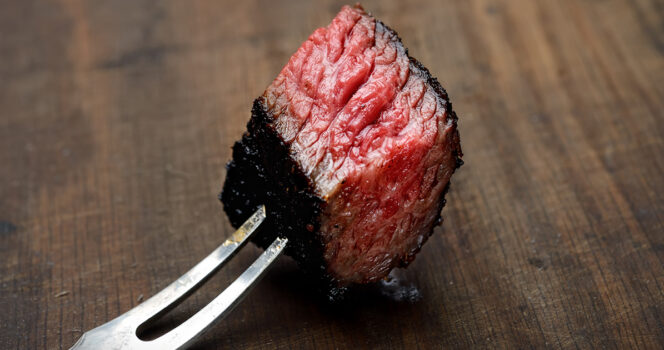
Everyone knows (right?) that you shouldn’t eat raw chicken.
At the same time, eating raw red meat is generally considered fine.
So why is that? Well, there’s actually a clear explanation.
Plenty of people love a juicy medium-rare ribeye or a pink-centered burger. But when it comes to chicken, the rules are very different — it always has to be cooked until the meat is white and the juices run clear.
So, why can we dig into a steak that’s still red in the middle but risk serious illness if chicken isn’t cooked all the way through? Meat is meat… or is it?
It’s all about the meat
Beef steaks are typically single cuts of muscle. That means any bacteria is usually only on the surface of the meat — and the searing process kills it off quickly. That’s why so many people feel perfectly fine eating beef rare.
Chicken, on the other hand, is a different story. According to the Centers for Disease Control and Prevention (CDC):
“When cooked, chicken can be a nutritious choice, but raw chicken can be contaminated with Campylobacter, Salmonella, or Clostridium perfringens germs.”
Because chicken is less dense, bacteria found on the surface can more easily make their way into the center of the meat. Cooking it all the way through is the only way to kill off those harmful germs.
The risks are real
I don’t know if you’re as cautious as I am, but I’m almost obsessive about making sure my chicken is fully cooked — and there’s a very good reason for it.
Not cooking chicken thoroughly puts you at serious risk for food poisoning. The CDC notes that Salmonella alone causes more foodborne illnesses than any other bacteria.
They warn: “If you eat undercooked chicken, you can get a foodborne illness, also called food poisoning. You can also get sick if you eat other foods or beverages that are contaminated by raw chicken or its juices.
CDC estimates that every year in the United States about 1 million people get sick from eating contaminated poultry. Chicken is a major source of these illnesses. In fact, about 1 in every 25 packages of chicken at the grocery store are contaminated with Salmonella.”
That means the chicken you pick up at your local supermarket could be carrying harmful bacteria unless it’s cooked properly.
How to protect yourself
The CDC recommends storing raw chicken on the bottom shelf of your fridge to prevent juices from dripping onto other foods, and washing your hands with soap and water for at least 20 seconds after handling.
Signs of a Salmonella infection include:
- Diarrhea
- Stomach cramps
- Fever
- Nausea
- Vomiting
- Chills
- Headache
- Blood in the stool
Most people recover within a few days to a week, but the illness can sometimes drag on longer. The CDC stresses that if symptoms persist for more than a few days, come with a high fever or bloody stools, or if dehydration sets in, you should seek medical care immediately.
Never wash raw chicken before cooking it
If you’ve ever rinsed raw chicken before cooking, you’re not alone. For years, countless recipes have included this step — and if you grew up doing it, it probably feels like second nature.
After all, it seems logical: wash the meat to get rid of bacteria, right?
Turns out, experts say this might be doing more harm than good.
According to Shared.com, an FDA poll found that 67% of Americans admit to washing their meat before cooking. But public health officials, germ experts, and even top chefs are now warning against the practice.
The U.S. Food and Drug Administration explains why:
“This practice is not recommended by food safety experts since washing will not destroy pathogens and may increase the risk of contaminating other foods and surfaces.”
Rinsing raw chicken can actually spread dangerous bacteria like Salmonella around your kitchen, landing on counters, utensils, and other foods.
The safest way to kill these germs? Skip the rinse and focus on cooking the chicken properly. High heat for the recommended time is what actually destroys harmful bacteria, keeping your meals safe and your family healthy.
READ MORE
- Man develops ‘pork worms’ after years of one specific cooking habit
- Expert share ‘incredibly effective’ tricks restaurants use to scam customers




